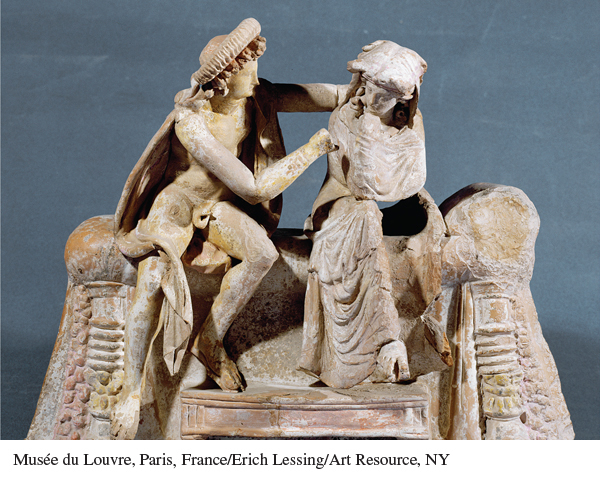A History of Western Society: Printed Page 92
A History of Western Society, Value Edition: Printed Page 87
A History of Western Society, Concise Edition: Printed Page 93
Introduction for Chapter 4
4
Life in the Hellenistic World
336–30 B.C.E.
When his father was assassinated in 336 B.C.E., twenty-
In many ways, life in the Hellenistic world was not much different from life in Hellenic Greece or from that in any other Iron Age agricultural society: most people continued to be farmers, raising crops and animals for their own needs and for paying rents and taxes to their superiors. Those who lived in cities, however, often ate foods and drank wine that came from far away, did business with people who were quite unlike them, and adopted religious practices and ways of thinking unknown to their parents. Hellenistic cities thus offer striking parallels to those of today.

CHAPTER PREVIEW
How and why did Alexander the Great create an empire, and what was its political legacy?
How did Greek ideas and traditions spread across the eastern Mediterranean and Near East?
What new economic connections were created in the Hellenistic period?
How did religion and philosophy shape everyday life in the Hellenistic world?
How did science and medicine serve the needs of Hellenistic society?
Chronology
| ca. 342–291 B.C.E. | Life of comedy writer Menander |
| 340–270 B.C.E. | Life of Epicurus, on whose ideas Epicureanism was based |
| 335–262 B.C.E. | Life of Zeno, on whose ideas Stoicism was based |
| 334–324 B.C.E. | Alexander the Great’s military campaigns |
| ca. 330–200 B.C.E. | Establishment of new Hellenistic cities |
| 323 B.C.E. | Alexander dies at age thirty- |
| 323–ca. 300 B.C.E. | War of succession leads to the establishment of Antigonid, Ptolemaic, and Seleucid dynasties |
| ca. 287–212 B.C.E. | Life of Archimedes |
| ca. 280 B.C.E. | Founding of the library of Alexandria by the Ptolemies |
| 168 B.C.E. | Roman overthrow of the Antigonid dynasty |
| 166–164 B.C.E. | Revolt of the Maccabees in Judaea |
| 30 B.C.E. | Roman conquest of Egypt; Ptolemaic dynasty ends |